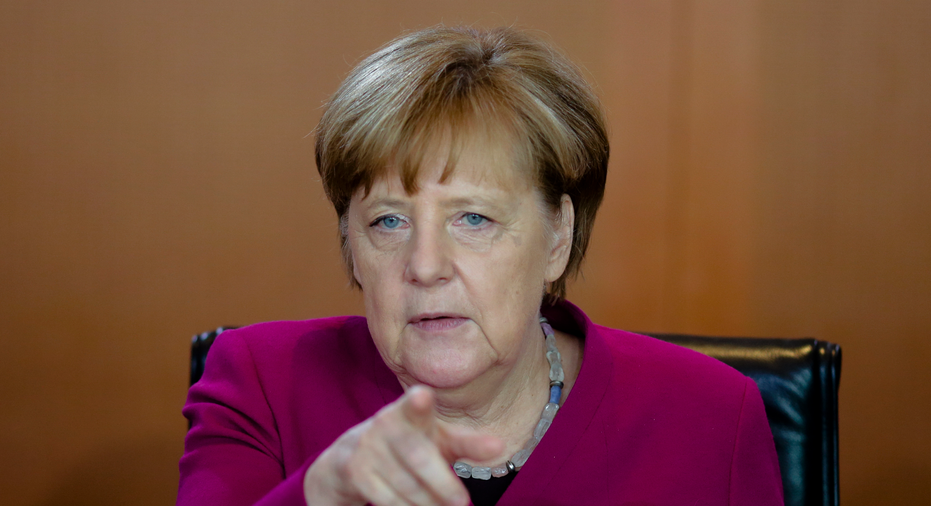A willingness to fix the euro's flaws is fading fast

FRANKFURT, Germany – When Angela Merkel was re-elected as Germany's leader in March, the way looked open for European nations to finally patch the remaining cracks in the euro — the structural flaws that threatened to break apart the shared currency in 2010-12.
Suddenly, those prospects for far-reaching agreements are fading, as one proposal after another falls by the wayside.
The reason: longstanding German fears of being handed the bill for financial profligacy in other member countries.
A long-awaited European Union summit June 28-29 may now produce vague agreements only on limited parts of wide-ranging proposals to strengthen the way the euro is set up. The bigger ideas for deeper eurozone integration, such as a common pot of money overseen by a European finance minister — an idea once allowed in principle by Merkel — are off the table. Prospects are also uncertain for plans to upgrade a bailout fund cobbled together during the crisis to a full-fledged European monetary fund to assist troubled countries.
German resistance bubbled up this week at a meeting of parliament deputies from Merkel's Christian Democratic Union. Merkel told lawmakers that upgrading the taxpayer-backed bailout fund, the European Stability Mechanism, would require amending the basic European Union treaty, the dpa news agency reported. That condition would likely kill the idea, since treaty change would take years.
Things looked quite different a few months ago. French President Emmanuel Macron won a resounding victory in presidential elections in June and pushed strongly for new measures to strengthen the European Union generally, and the euro in particular, to overcome popular discontent fuelling anti-EU populist parties and candidates. Merkel cautiously allowed the possibility of a European finance minister and formed a government with the pro-EU Social Democrats.
But the opening for change didn't last. The Social Democrat's choice for finance minister, Olaf Scholz, made clear that not all Macron's ideas could be realized. Macron and Merkel are to meet Thursday in Berlin for further discussions.
"The optimism was misplaced... It's clear Macron's ambitions are in tatters," said Mujtaba Rahman, managing director Europe for the Eurasia Group consultancy. Rahman said the June summit would likely end with a vague promise on only two key reform proposals. One would be to move ahead with deposit insurance at the EU level, legislation proposed in 2015 but still not enacted.
EU-wide deposit insurance would help make banks resistant to panics that might overwhelm a single country's resources. The German position is that countries whose banks carrying lots of bad loans — notoriously, Italy — need to remove those risks before entering a new insurance program.
The other possible step is to let Europe's new banking authority tap the bailout fund's borrowing power. That would strengthen the eurozone's ability to counter banking troubles.
Other ideas, such as reserving part of the EU's budget to bolster government spending in countries hit by severe recessions or a crisis, face much tougher sledding, however.
The eurozone crisis showed that the currency union — as it was set up in 1999 — lacked a way to help a country that runs into serious financial trouble. Usually, troubled countries let their currency exchange rates fall, and cut interest rates through an independent central bank. The pain is serious but passes quickly. Greece and Ireland couldn't do that because they lacked their own currency.
The solution pushed by Merkel and other northern European governments was bailout loans in return for crushing austerity: restrictions on government spending. That policy delayed economic recovery and led to higher taxes and lower pensions. Just as worrisome, years of austerity helped fuel anti-EU populism and drove political wedges between member countries, as evidenced by Greek newspapers showing Merkel in Nazi uniform. A group of prominent economists expressed concern that the eurozone "remains fragile" and vulnerable to another crisis down the road.
The financial crisis also exposed a toxic link between Europe's banks and governments. When Greece went bankrupt, so did its banks, which were creditors of the government through holding its bonds. When Ireland's banks choked on bad real estate loans, the government wound up bailing them out and ruining its own finances.
Some reforms were made. In 2014, the EU put banking oversight in the hands of the European Central Bank, rather than national authorities who could be slow to blow the whistle on trouble at favored home banks. The new system can force a troubled bank to be sold or restructured, leaving losses with bondholders instead of taxpayers — as it did with Spain's Banco Popular in June.
The European Central Bank says that deposit insurance, if properly set up, would not result in permanent subsidies to countries with riskier banks.
Such assurances, however, seem to cut no ice.
"The discussion here in Germany has become so dogmatic that people are not listening to the details," said economist Carsten Brzeski at ING in Frankfurt. "These things are so technical — they won't get you a single vote."



















